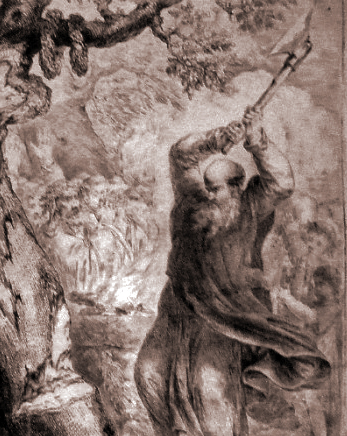Brunhilda, Chlothar II and Dagobert I
or ‘the Christianisation of the idea of king’.
‘… a wild political animal’. —J. Richards referring to Brunhilda.
‘Precisely under this sovereign, as can be clearly demonstrated, the Christianisation of the idea of the king reached one of its first peaks’. —H.H. Anton, concerning Chlothar II.
‘… God gracious above all measure… he heard him above all in the advice of St. Arnulf, bishop of the city of Metz… He heard him also in the warnings of his steward Pipinus and Kunibert, bishop of Cologne’. —Fredegar, alluding to Dagobert I.
‘He filled with fear and terror all the kingdoms around him’. —Liber Historiae Francorum.
Pope Gregory I gallivanting with ‘a wild political animal’
In the year 592, the oldest of the Merovingian kings, Guntram, died in the Frankish kingdom after a series of threats and attacks, and he died without leaving any descendants. But after the death of his own sons he had adopted his eldest grandson, still a minor, Childebert II (575-596), leaving him part of his kingdom. He thus ruled two partial kingdoms: Austrasia and Burgundy. Childebert, who in the last period of his life subdued the rebellious Bretons in the west and a Thuringian people between the Saale and Elbe in the east, soon came under the full influence of his mother.
The powerful Brunhilda, the most prominent figure in the Frankish kingdom, had in 575 imposed her five-year-old son’s rule in Austrasia and settled the ensuing power struggle with the Austrian nobles of Guntram’s camp in her favour, and in favour of the kingship.
In his letters, the holy father completely ignores Brunhilda’s dreadful family discord. He sees her, her son, her kingdom and all the other kingdoms won for the right faith ‘as bright lamps shining and illuminating amidst the night darkness of unbelief’. He repeatedly thanks her for the support she has given to his English missionaries on their journey through the Frankish kingdom. He extols her ‘love for the prince of the apostles, Peter, to whom you are wholeheartedly devoted, as I know’. And he asks for her help, often in vain, against simony, schismatic groups and ‘pagan’ cults.
 Gregory exhorts Brunhilda to forcibly prevent the worship of sacred trees and other idolatries and recommends the use of scourging, torture and imprisonment to obtain the conversion of rebellious ‘pagans’. And, of course, the pope also sent relics to the queen.
Gregory exhorts Brunhilda to forcibly prevent the worship of sacred trees and other idolatries and recommends the use of scourging, torture and imprisonment to obtain the conversion of rebellious ‘pagans’. And, of course, the pope also sent relics to the queen.
Gregory I wrote to the powerful queen, who supposedly ruled the Church, about a dozen letters, usually in a tone of syrupy flattery, which he also used with the imperial house, both with the (later) victim and the murderer. With some restraint he began the first papal epistle: ‘Your Excellency’s character, praiseworthy and pleasing to God, is to be seen both in your government and in the education of your son’, but it soon got louder. And while ‘Gregorian chant’ had nothing to do with Gregory, here he could sing in higher and higher tones:
How great are the gifts which God has bestowed on you, and with what clemency the grace of heaven swells your heart, not only do your many other merits attest, but they are especially recognised in the fact that you rule the coarse hearts of heathen peoples with the art of cautious prudence, what is still more meritorious, the regal power is accompanied by the adornment of wisdom.
Brunhilda was not only powerful but also useful to the Church. She made numerous donations and built abbeys, and the pope even asked for her support for the reform of the Frankish Church and the protection of ecclesiastical property.
One reply on “Christianity’s Criminal History, 143”
Brunhilda was truly a real-life villain in that dark time.